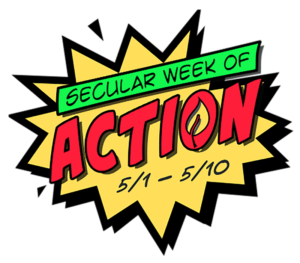We Need Action During a Crisis

How much prayer is needed to end the coronavirus pandemic? If someone could explain to me how many people, how many times, and how to do it properly, then I might feel comforted by the current administration’s dependence on prayer. Instead of listening to medical professionals and taking swift action to protect the health and safety of the country, President Trump has wasted precious time making excuses, arguing with reporters, sharing misinformation, and promoting religion over science. Unfortunately this behavior is not a surprise, as it is the same way he handles most crises.
However, I was surprised to hear that Trump declared March 15, 2020, as a National Day of Prayer because the National Day of Prayer was established in 1952 to be the first Thursday in May. Each year the president proclaims it to be a day of “personal repentance and prayer,” and each year the secular movement—supported by legislators nationally and locally—proclaims it as the National Day of Reason “to affirm our commitment to the constitutional separation of religion and government, and to celebrate reason as the guiding principle of our secular democracy.” As the Humanist Manifesto III states: “The lifestance of humanism—guided by reason, inspired by compassion, and informed by experience—encourages us to live life well and fully.”
To broadcast the importance of acting with reason and compassion, the Secular Coalition for America (of which the American Humanist Association is a member) established the Secular Week of Action to take place around the National Day of Reason. During the week, secular and humanist groups organize service projects, educational events, and advocacy opportunities.
For 2020, the Secular Week of Action has been extended as May 1-10 to cover two weekends, making it more convenient for groups to organize activities. Under the direction of Foundation Beyond Belief (a partner of the AHA), it also has a theme this year: A Compassionate Response to COVID-19. Our current public health crisis has forced the postponement and cancellation of many in-person events, but our communities are finding ways to still serve those most vulnerable, host events online so people can join from the safety of their homes, and enjoy physical distancing while staying socially connected.
Supporting Communities in Need
There are many ways that we can provide aid to people facing hardships due to business and school closures, travel bans, and the coronavirus itself. Foundation Beyond Belief recommends donating to food banks and homeless shelters, making and delivering meals, donating blood (while still protesting the unethical ban on blood donations from gay and bisexual men), holding virtual fundraisers, and assisting vulnerable neighbors with errands. Local Mutual Aid groups are a great way to build resilience in our communities. They often seek people who can offer translation services (for calling in medication prescriptions, etc.), emotional support to nursing home residents, cleaning services, gardening/mowing, and delivery handling.
Reach out to people in your local humanist group and neighborhood to find out what needs you can address together. Sometimes support means providing supplies (like face masks and gloves) and other times it means providing care (like letters or phone calls).
Bring Opportunities Online
Many groups, including the AHA, are moving previously scheduled programs online. Using video conferencing systems, groups can hold discussions, listen to talks, watch videos, and enjoy each other’s company. For programming ideas, check out our climate change initiative HERE for Climate, our online courses (which include recordings from our Open Lecture Series), our YouTube Channel, and other articles on TheHumanist.com. We’re also adding more actions to the Humanist Action Headquarters so your group can discuss local legislation online and develop talking points together to send to your legislators or compose a letter to the editor through our easy-to-use system.
To find more online events and activities, see what your local AHA group is organizing, visit the Secular Week of Action website (groups can submit their events there), enjoy Camp Quest’s Quest at Home, and explore American Ethical Union’s new Ethical Community page.
Outside and at a Distance
Although many of us are staying home and avoiding unnecessary trips, it’s still important to go outside. Breathe the fresh air, soak up the sun, smell the flowers, and break away from your screens. This could be a great time to work on your own composting, for example. Groups can still participate in outdoor activities like hikes, bike rides, bird watching, and nature walks as long as you keep the gathering small and stay a safe distance apart from each other. Make sure to check your local park or conservation center to see what areas are still open to the public. Some park and highway cleanups may still be an option with proper gear.
We look forward to celebrating Secular Week of Action with you all—from a safe and healthy distance. I’d love to know how you plan to take action this year.
